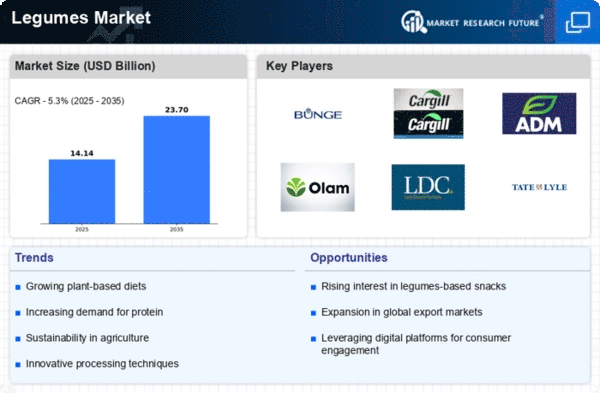Market Trends
Key Emerging Trends in the Legumes Market
The Legumes Market has undergone significant shifts and trends in recent years, reflecting changes in consumer preferences, dietary patterns, and a growing awareness of the nutritional benefits associated with legumes. Legumes, including beans, lentils, chickpeas, and peas, have gained prominence as a versatile and nutritious food source. One noteworthy trend shaping the market is the increasing adoption of plant-based diets. As more consumers embrace vegetarian and vegan lifestyles, legumes have become a staple protein source, offering an affordable and sustainable alternative to animal products. This trend aligns with a broader movement towards healthier and more environmentally conscious eating habits. Legumes, comprising beans, lentils, and peas, stand out as nutritional powerhouses with multifaceted benefits. Lentils, in particular, are noteworthy for their richness in polyphenols, providing a natural shield against harmful ultraviolet (UV) radiations. This protective quality makes lentils a valuable addition to the diet, promoting skin health and minimizing the potential damage caused by sun exposure. Additionally, lentils serve as an excellent source of protein and iron, contributing to the body's vital functions and supporting overall well-being.
Beans, another integral legume, emerge as a substantial protein source, particularly potent when paired with lentils. Beyond their protein content, beans exhibit antioxidant properties, playing a pivotal role in reducing the risk of cancer. The presence of antioxidants in beans contributes to cellular health by neutralizing free radicals and mitigating oxidative stress, which is associated with various chronic diseases. As a combined force, lentils and beans exemplify the nutritional richness inherent in legumes, offering a holistic package of protein, iron, polyphenols, and antioxidants. Integrating these legumes into a balanced diet not only enhances dietary diversity but also promotes a spectrum of health benefits, reinforcing their role as indispensable components of a wholesome and nourishing eating plan. Moreover, the rising awareness of the nutritional value of legumes is driving their consumption across various demographic groups. Legumes are rich in protein, fiber, vitamins, and minerals, making them an attractive option for those seeking nutrient-dense foods. The health-conscious consumer is recognizing the benefits of incorporating legumes into their diet, contributing to the market's growth. Additionally, legumes' low glycemic index and potential to manage blood sugar levels make them appealing to individuals focused on managing conditions like diabetes.
The increasing demand for sustainable and eco-friendly food options is another significant trend in the Legumes Market. Legumes are recognized for their nitrogen-fixing properties, which enhance soil fertility and reduce the need for synthetic fertilizers. As sustainability becomes a key consideration for consumers, the market is witnessing a surge in demand for legumes produced through environmentally friendly and ethical farming practices. This trend is not only driven by environmental concerns but also by consumers seeking products aligned with their values of social responsibility and ethical sourcing.
Furthermore, the versatility of legumes is contributing to their popularity in various food products. Legumes are now featured in an array of processed foods, including plant-based meat alternatives, snacks, and protein-rich supplements. This diversification of legume-based products caters to consumer preferences for convenient and innovative food options. The market is responding to this trend with increased product development and marketing efforts to highlight the adaptability of legumes in different culinary applications.
The Legumes Market is also witnessing globalization, with a growing awareness and acceptance of legumes in regions where they were not traditionally a dietary staple. This is partly driven by the promotion of legumes as part of sustainable agriculture and food security initiatives globally. The integration of legumes into diverse cuisines and culinary traditions contributes to their market expansion and provides consumers with a broader range of legume-based products.
Challenges in the Legumes Market include concerns related to anti-nutritional factors and flatulence-inducing compounds present in some legumes. However, ongoing research and innovation aim to address these challenges through breeding programs and processing techniques that improve the sensory and nutritional qualities of legumes.



















Leave a Comment